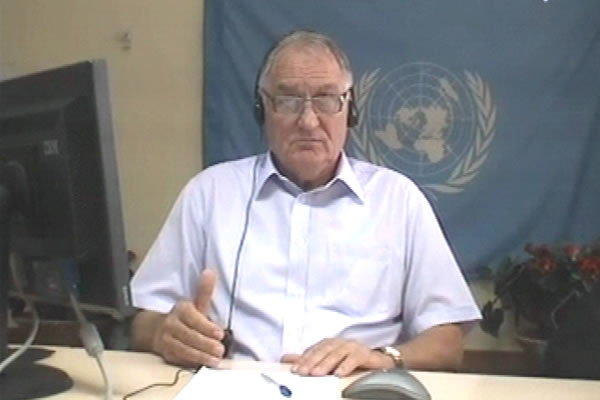Home
FROM YES TO NO AND BACK AGAIN
Yesterday General Bosko Kelecevic admitted that the Bosnian Serb main strategic goal – the separation of Serbs from the other two ethnic groups in BH – had been implemented through the commission of the gravest crimes against Muslim and Croat civilians. In the re-examination today, the witness ‘categorically denied’ it. When the prosecutor pressed him, Kelecevic agreed that the non-Serbs ‘had no other choice’ but to leave because their property had been destroyed
 Bosko Kelecevic, defence witness at Rako Mladic trial
Bosko Kelecevic, defence witness at Rako Mladic trial Yesterday the prosecutor asked General Bosko Kelecevic if the Bosnian Serb Army used murder, detention, forcible expulsion of the non-Serb civilians and the destruction of their property as a means to separate the Serb people from the other two ethnic groups in BH, thus enabling Serbs to create their own state. The witness did not give the question much thought. His answer was quick and short: ‘Yes’. Today, in the re-examination Kelecevic denied this allegation several times when defense counsel Branko Lukic asked him the same question, thus retracting the admission he had made yesterday. Kelecevic was the chief of staff in the VRS 1st Krajina Corps during the war in BH. He is testifying in Ratko Mladic’s defense.
Today the defense counsel rephrased the question the prosecutor had asked yesterday, breaking it down into a few short ones. First, the defense counsel asked Kelecevic if the 1st Krajina Corps and the Republika Srpska Army had implemented the separation of the BH ethnic groups by killing non-Serb civilians. ‘No, one cannot put it that way’, the witness replied. Kelecevic added that loyal Muslims and Croats were protected. Asked if the ethnic communities were separated through the forcible evacuation of civilians, Kelecevic responded that only those that wanted to leave could do so. Kelecevic ‘categorically’ denied that the ethnic separation was implemented by destroying property, noting that houses were destroyed only in fighting.
As he was questioned further by the defense counsel, the witness said that the Bosnian Serbs’ main military goal was to establish a state in the territories from which the ‘enemy’ had been expelled. In other words, the goal was not to conquer but to defend and focus only on those territories where Serbs were in the majority.
The prosecutor was granted permission to ask Kelecevic a few questions before the end of his testimony. The prosecutor noted that the municipalities where Serbs were not a majority before the war also became part of the Serb state in BH. This included Prijedor, Sanski Most and Kotor Varos, the prosecutor explained, adding that those municipalities were in the area of responsibility of the 1st Krajina Corps.Muslims and Croats left those municipalities because ‘they had no other choice’, as the prosecutor put to the witness, because their property had been destroyed. Once again Kelecevic agreed with the suggestion although he thus contradicted his previous answers to the defense. Kelecevic didn’t deny that as time went by, Serbs became the majority in those municipalities too.
Asked if before the war Serbs were in the majority in 70 per cent of the BH territory – the area the VRS held under its control in late 1992 – the witness first said that he didn’t know the exact percentage. Kelecevic then added that the issue of who could lay claim to which territory was ‘contentious’. ‘It was up to the others to solve the issue’, Kelecevic replied. He apparently meant that this was the politicians’ task.
The high-ranking officer from the 1st Krajina Corps thus completed his four-day testimony. Apart from his interview with the OTP investigators in 2001, this was Kelecevic’s first appearance before the Tribunal. The witness testified via video link.
Mladic’s last defense witness before the Tribunal’s summer recess is Zdravko Salipur, former member of the Crisis Staff of the Novo Sarajevo municipality.
Linked Reports
- Case : Mladic
- 2015-07-15 CRIMES PAVED WAY TO SERB STATE IN BH
- 2015-07-14 NO PUNISHMENT FOR CRIMES IN BOSNIAN KRAJINA
- 2015-07-13 OFFICER OF ‘EUROPE’S LARGEST CORPS’ DENIES CRIMES
- 2015-08-10 CONTESTING CLAIMS ON CULTURAL HERITAGE DESTRUCTION
- 2015-08-11 WAS DESTRUCTION OF MOSQUES ‘HAPHAZARD’ OR ORGANIZED?
- 2015-08-12 COMMANDER AT WEDDING, TROOPS AT EXECUTION SITES
